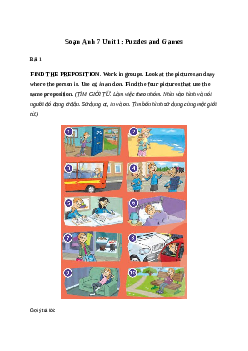










Preview text:
Soạn Anh 7 Unit 1: Language Focus 1 Bài 1
Complete the sentences with the words in the box. Then check your answers
in the forum on page 12. (Hoàn thành các câu với các từ trong hộp. Sau đó, kiểm tra
câu trả lời của bạn trong diễn đàn ở trang 12.)
doesn’t (không) don’t (không) don’t (không) studies (học) want (muốn) watches (xem) We don’t use our phones.
(Chúng tôi không sử dụng điện thoại.)
1. She’s older and she ______ more. 2. But she ______study! 3. I ______ watch much TV.
4. I just ______ to sleep in my bedroom! 5. My nan ______ TV a lot. Gợi ý trả lời: 1. studies 2. doesn’t 3. don’t 4. want 5. watches
1. She’s older and she studies more.
(Cô ấy lớn hơn và cô ấy học nhiều hơn.)
Giải thích: Chủ ngữ “she” số ít + V-s/es => studies.
2. But she doesn’t study!
(Nhưng cô ấy không học!)
Giải thích: Chủ ngữ “she” số ít, sau chỗ trống đã có động từ nguyên thể “study” => doesn’t.
3. I don’t watch much TV.
(Tôi không xem TV nhiều.)
Giải thích: Chủ ngữ “I” và sau chỗ trống đã có động từ nguyên thể “watch” => don’t.
4. I just want to sleep in my bedroom!
(Tôi chỉ muốn ngủ trong phòng ngủ của mình!)
Giải thích: Chủ ngữ “I” + V(nguyên thể)
5. My nan watches TV a lot.
(Bà của tôi xem TV rất nhiều.)
Giải thích:Chủ ngữ “my nan” số ít + V-s/es => watches. Bài 2
Complete the Rules with five words from the box. (Hoàn thành các Quy tắc với năm từ trong hộp.)
doesn’t (không) don’t (không) end (kết thúc) habits (thói quen)
routines (hoạt động thường ngày) start (bắt đầu) RULES
1. We use the present simple to talk about facts, _______ and _______ .
2. Affirmative verbs _______ with -s / es in he / she / it forms.
3. Negative forms use _______ + infinitive without to after I / you / we / they.
4. Negative forms use_______ + infinitive without to after he / she / it. Gợi ý trả lời: 1. habits - 2. end 3. don’t 4. doesn’t routines
RULES (QUY TẮC)
1. We use the present simple to talk about facts, habits and routines.
(Chúng ta sử dụng thì hiện tại đơn để nói về các sự kiện, thói quen và quy trình.)
2. Affirmative verbs end with -s / es in he / she / it forms.
(Động từ khẳng định kết thúc bằng -s / es ở dạng he / she / it.)
3. Negative forms use don’t + infinitive without to after I / you / we / they.
(Dạng phủ định sử dụng don’t + động từ nguyên mẫu sau I / you / we / them.)
4. Negative forms use doesn’t + infinitive without to after he / she / it.
(Dạng phủ định sử dụng doesn’t + động từ nguyên mẫu sau he / she / it.) Bài 3
Choose the correct words. (Chọn từ đúng.)
Some students finish/ finishes school at 5 p.m.
(Một số học sinh tan học lúc 5 giờ chiều.)
Giải thích:danh từ số nhiều “students” + V (nguyên thể)
1. My mum don’t / doesn’t like games.
2. She don’t / doesn’t play much.
3. Mark study / studies a lot.
4. His friends don’t / doesn’t work much.
5. My friends and I watch / watches films on my computer. Gợi ý trả lời: 1. doesn’t 2. doesn’t 3. studies 4. don’t 5. watch
1. My mum doesn’t like games.
(Mẹ tôi không thích trò chơi.)
Giải thích: danh từ số ít “my mum”, sau chỗ trống đã có động từ nguyên thể "like" => doesn’t
2. She doesn’t play much.
(Cô ấy không chơi nhiều.)
Giải thích: Chủ ngữ số ít “she”, sau chỗ trống đã có động từ nguyên thể "play" => doesn’t 3. Mark studies a lot.
(Mark học rất nhiều.)
Giải thích: Chủ ngữ số ít “Mark” => V-s/es
4. His friends don’t work much.
(Bạn bè của anh ấy không làm việc nhiều.)
Giải thích:Chủ ngữ số nhiều “friends”, sau chỗ trống đã có động từ nguyên thể "like" => don’t
5. My friends and I watch films on my computer.
(Tôi và bạn bè xem phim trên máy tính của tôi.)
Giải thích: Danh từ số nhiều “my friends and I” => V Bài 4
PRONUNCIATION. Third person –s. Listen. Then practise the examples.
(Phát âm. Ngôi thứ ba –s. Nghe. Sau đó thực hành các ví dụ.) /s/ /z/ /ɪz/
sleeps /sliːps/ (ngủ)
says /seɪz/ (nói)
finishes /ˈfɪnɪʃɪz/ (kết thúc) Bài 5
Listen to eight more verbs and add them to the table in exercise 4. Practise
saying them. (Nghe thêm tám động từ và thêm chúng vào bảng trong bài tập 4.
Thực hành nói chúng.) Bài nghe:
studies /ˈstʌdiz/: học
watches /wɒtʃɪz/: xem
spends /spendz/: tiêu xài
lives //lɪvz/: sống
allows /əˈlaʊz/: cho phép
lets /lets/: để cho
plays /pleɪz/: chơi
works /wɜːks/: làm việc Gợi ý trả lời: /s/ /z/ /ɪz/ lets studies watches works spends lives allows plays Bài 6
Complete the text with the correct form of the verbs in brackets. (Hoàn
thành văn bản với dạng đúng của các động từ trong ngoặc.)
I like (like) my brother, but I (1) _________ (think) he has a problem. He (2) _________ (not sleep) much
at weekends because he(3) _________ (play) video games all dayand (4)
_________ (watch) TV all night.
Hisfriends (5) _________ (not see) him veryoften because he (6) _________ (stay) inhis room and he (7)
_________ (not go)outside. He (8) _________ (speak) to uson his mobile phone when he’s hungry. I(9)
_________ (not know) if this is normal. Please help! Messifan Gợi ý trả lời: 1. think 2. doesn’t 3. plays sleep 4. watches 5. don’t see 6. stays 7. doesn’t 8. speaks 9. don’t go know
I like (like) my brother, but (1) I think he has a problem. He (2) doesn’t sleep
much at weekends because he (3) plays video games all day and (4) watches
TV all night. His friends (5) don’t see him very often because he (6) stays in
his room and he (7) doesn’t go outside. He (8) speaks to us on his mobile
phone when he’s hungry. I(9) don’t know if this is normal. Please help! Messifan Giải thích:
1. I + V (nguyên thể) => I think
2. he + doesn’t V => he doesn’t sleep
3. he + Vs/es => he plays
4. he + Vs/es => he watches
5. chủ ngữ số nhiều “friends” + don’t V => don’t see
6. he + Vs/es => he stays
7. he + doesn’t V=> he doesn’t go
8. he + Vs/es => he speaks
9. I + don’t V => I don’t know Hướng dẫn dịch:
Tôi thích anh trai tôi, nhưng tôi nghĩ anh ấy có vấn đề. Anh ấy không ngủ nhiều
vào cuối tuần vì anh ấy chơi trò chơi điện tử cả ngày và xem TV suốt đêm. Bạn
bè của anh ấy không gặp anh ấy thường xuyên vì anh ấy ở trong phòng và anh
ấy không ra ngoài. Anh ấy nói chuyện với chúng tôi trên điện thoại di động khi
anh ấy đói. Tôi không biết điều này có bình thường không.
Xin vui lòng giúp đỡ! Messifan Bài 7
USE IT! Write true and false sentences using the words in the boxes. Use
affirmative and negative forms. Compare with your partner. (Thực hành!
Viết các câu đúng và sai bằng cách sử dụng các từ trong các hộp. Sử dụng các
hình thức khẳng định và phủ định. So sánh với bạn của bạn.)
I spend a lot of time on the phone.
(Tôi dành nhiều thời gian trên điện thoại.)
My mum doesn’t play video games.
(Mẹ tôi không chơi trò chơi điện tử.) Gợi ý trả lời:
- My dad doesn’t usually watch football on TV.
(Bố tôi không thường xem bóng đá trên TV.)
- My teacher speaks English fluently.
(Giáo viên của tôi nói tiếng Anh lưu loát.)
- My friends don’t like playing outside.
(Bạn bè của tôi không thích chơi bên ngoài.)
- Most people spend a lot of time surfing the net.
(Hầu hết mọi người dành nhiều thời gian để lướt net.) Hoặc:
- I spend a lot of time speak to my friends on the phone.
- My mum doesn’t play video games. - My dad watches TV. - My teacher speaks English.
- Most people like video games. Hướng dẫn dịch:
- Tôi dành nhiều thời gian nói chuyện điện thoại với bạn bè.
- Mẹ tôi không chơi trò chơi điện tử. - Bố tôi xem TV.
- Giáo viên của tôi nói tiếng Anh.
- Hầu hết mọi người đều thích trò chơi điện tử. Finished?
Write sentences about your screen time: what your parents let you do, and
what they don’t allow you to do. (Hoàn thành bài học? Viết các câu về thời
gian sử dụng thiết bị của bạn: bố mẹ bạn cho phép bạn làm gì và họ không cho phép bạn làm gì.) Gợi ý trả lời:
My parents let me use the computer to relax after finishing my homework.
(Bố mẹ cho tôi sử dụng máy tính để thư giãn sau khi làm xong bài tập.)
They don’t allow me to talk on the phone when I am studying.
(Họ không cho phép tôi nói chuyện điện thoại khi tôi đang học.)
Document Outline
- Soạn Anh 7 Unit 1: Language Focus 1
- Bài 1
- Bài 2
- Bài 3
- Bài 4
- Bài 5
- Bài 6
- Bài 7
- Finished?




